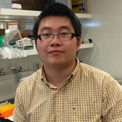
Trainee Spotlight: Yifan Wang, PhD
-

Yifan Wang, PhD
Postdoc Associate
Dr. Neil Johnson's Lab
Fox Chase Cancer Center
[email protected]Biography
When I was young I never dreamed of being a scientist until my father died of liver cancer when I was twelve years old. After his death, I chose to become a pharmacist to develop new, effective drugs to fight cancer and I initially pursued a bachelor’s degree in the field of biopharmaceutics at the Chinese Pharmacology University. During my last semester, however, my focus changed following an experience in Dr. Luo Lu’s lab at Shanghai Institute of Health Sciences. During this lab experience, I helped establish a mouse embryonic fibroblast cell line conditionally expressing a dominant negative form of ERK. I realized through this experience that biology and research were my passions—the research scientist was born! To continue my education, I next pursued a Master’s degree at Shanghai Institute of Biochemistry and Cell Biology, where I worked on the effects of triptolide on the development of arthritis. I continued my Ph.D. studies in Dr. Ciaran Morrison’s lab at National University of Ireland, Galway, where I studied the centrosomal protein, pericentrin, using reverse genetics. Following my Ph.D., I desired to get back to more translational-based research. With this goal in mind, I joined Dr. Neil Johnson’s lab at Fox Chase Cancer Center in 2013. My current research focus centers on the field of DNA repair and chemotherapy resistance. My future plans are to determine the ability of novel or established compounds to target DNA repair pathways and kill chemotherapy resistant cancers.
Research Overview
Inhibitors of PARP (PARPi), as well as platinum agents, induce double-stranded DNA breaks and are potentially effective therapeutic agents for sensitizing cancer cells with defective DNA repair pathways. In fact, cells with dysfunctional BRCA1 or BRCA2 proteins, which normally mediate efficient homologous recombination-mediated double strand DNA break repair, are highly sensitive to PARPi and platinum treatments. However, there is a subset of patients with germline BRCA1 or BRCA2 mutations that do not gain a benefit from PARPi therapy. Furthermore, many patients that first benefit from PARPi or platinum therapies, develop resistance and their disease progresses. In this study, we investigated why some patients are resistant to PARPi therapy. We found that a splice isoform of BRCA1, referred to as BRCA1-Δ11q, was expressed most abundantly in cancers harboring germline mutations in exon 11 region of BRCA1 gene. BRCA1-Δ11q was capable of compensating for full length BRCA1 in response to DNA damaging chemotherapeutics. Furthermore, we found that BRCA1-Δ11q expressing cells were resistant to PARPi and cisplatin treatments, and patients with BRCA1 frameshift mutations located inside exon 11, had decreased 5 year survival compared to patients with mutations outside of exon 11. Together our data suggest that expression of BRCA1-Δ11q is likely responsible for the chemo-resistance and decreased survival found in patients with BRCA1 exon 11 located mutations.
Featured Publication
Wang Y, Bernhardy AJ, Cruz C, Krais JJ, Nacson J, Nicolas E, Peri S, van der Gulden H, van der Heijden I, O'Brien SW, Zhang Y, Harrell MI, Johnson SF, Candido Dos Reis FJ, Pharoah PD, Karlan B, Gourley C, Lambrechts D, Chenevix-Trench G, Olsson H, Benitez JJ, Greene MH, Gore M, Nussbaum R, Sadetzki S, Gayther SA, Kjaer SK; kConFab Investigators, D'Andrea AD, Shapiro GI, Wiest DL, Connolly DC, Daly MB, Swisher EM, Bouwman P, Jonkers J, Balmaña J, Serra V, Johnson N. The BRCA1-Δ11q Alternative Splice Isoform Bypasses Germline Mutations and Promotes Therapeutic Resistance to PARP Inhibition and Cisplatin Cancer Res. 2016 May 1;76(9):2778-90.
